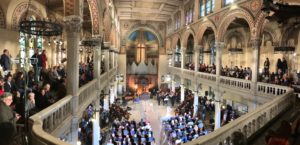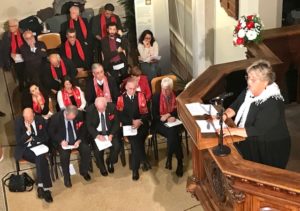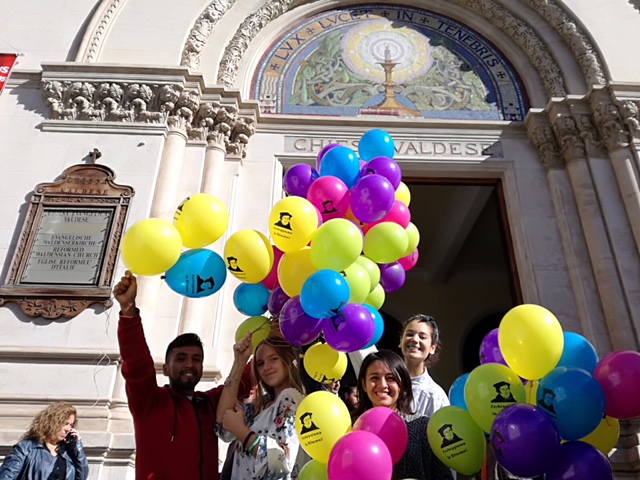Rome (NEV), November 4, 2017 – The National Reformation Day, whose motto was “Free to Love and Serve”, ended with the performance of the Reformation Symphony, op. 107, by Felix Mendelssohn-Bartholdy, executed by the “Concerts in the Temple” Orchestra, conducted by Daniele Camiz. In the Waldensian temple of Piazza Cavour in Rome, crowded with people since the morning, went along debates, symbolic actions, biblical readings, prayers and official greetings.
Satisfaction of the organizers
 Pastor Luca Maria Negro, as president of the Federation of Protestant Churches (FCEI), expressed the satisfaction for the outcome of the National Day of the 500th Anniversary of the Reformation, and in particular for the presence of qualified members of the Catholic world, of the evangelical churches which are not members of the Federation (Pentecostals and Adventists) and of the secular cultural milieu. He was also pleased for the attention given by State institutions; for the visit to the President of the Italian Republic, Sergio Mattarella, which happened a few days earlier (October 24); for the messages of the Senate President Pietro Grasso and of the Prime Minister Paolo Gentiloni; for the media attention, in particular through the excellent TV service “Speciale TG2” which took up the event for more than an hour; for the enthusiastic participation of the FCEI member churches and finally for the presence of numerous musical groups and many evangelical children and young people.
Pastor Luca Maria Negro, as president of the Federation of Protestant Churches (FCEI), expressed the satisfaction for the outcome of the National Day of the 500th Anniversary of the Reformation, and in particular for the presence of qualified members of the Catholic world, of the evangelical churches which are not members of the Federation (Pentecostals and Adventists) and of the secular cultural milieu. He was also pleased for the attention given by State institutions; for the visit to the President of the Italian Republic, Sergio Mattarella, which happened a few days earlier (October 24); for the messages of the Senate President Pietro Grasso and of the Prime Minister Paolo Gentiloni; for the media attention, in particular through the excellent TV service “Speciale TG2” which took up the event for more than an hour; for the enthusiastic participation of the FCEI member churches and finally for the presence of numerous musical groups and many evangelical children and young people.
A day which confirmed the vitality of the Italian Protestantism as a minority open to dialogue, strongly committed in social work, eager to live the Gospel freedom through service, to witness its faith and to spread in the Country the knowledge of the Bible. Among the many qualifying moments of the day, in fact, there was the presentation of the New Testament of the “Reformation Bible”, a new biblical translation realized in cooperation with evangelical churches.
In the afternoon took part in the programme, among others, Don Cristiano Bettega, Director of the National Office for Ecumenism and Dialogue of the Italian Bishop Commission (CEI); Heikki Huttunen, General Secretary of the European Churches Conference (KEK) and Karin Burstrand, Vice-president of KEK. These last two were back from the meeting “(Re)thinking Europe – A Christian contribution to the future of the European project”, organized in Rome by the Commission of the European Episcopal Conferences in the European Union (COMECE).
The main topics
 Many topics and contents emerged during the Day: migration, humanitarian corridors, ecumenism, dialogue, the work of the Education Service of FCEI and the diaconal work. The round table “The relevance to the present of the Protestant Reformation in a religious pluralistic Italy”, was moderated by Silvana Nitti, historian and author of a new biography of Luther, just released by the publishing house ‘Salerno Editrice’. Cardinal Gianfranco Ravasi spoke of Luther as an important figure from a human point of view, whose spiritual experience “interrogates us and reminds us that we can do nothing without God”. Speaking of the future of Christianity which has a common source and whose many streams flow into the same river, he imagined an estuary of “unity to be conceived not as uniformity, but as a permanent plurality”. The Adventist theologian Hanz Gutierrez spoke of hermeneutics in society, in communities, and in the reading of the Bible, analyzing how to recover from crushing to unity, aspiring to a “converging complexity that allows dialogue”. Historian Enrico Rusconi, “in an effort to understand, from a laic and agnostic point of view, a supposed return to God and a metamorphosis of religions”, pressed for a debate between secular thinking and theologians also including Islam. The Waldensian theologian Daniele Garrone underlined that, “in spite of the tiny minority (0,17% of the Italian population), we are very vocal, thanks to our social commitment, our extreme defence of democracy, of freedom in responsibility, of the faith as a paradox which can only be told and not demonstrated”.
Many topics and contents emerged during the Day: migration, humanitarian corridors, ecumenism, dialogue, the work of the Education Service of FCEI and the diaconal work. The round table “The relevance to the present of the Protestant Reformation in a religious pluralistic Italy”, was moderated by Silvana Nitti, historian and author of a new biography of Luther, just released by the publishing house ‘Salerno Editrice’. Cardinal Gianfranco Ravasi spoke of Luther as an important figure from a human point of view, whose spiritual experience “interrogates us and reminds us that we can do nothing without God”. Speaking of the future of Christianity which has a common source and whose many streams flow into the same river, he imagined an estuary of “unity to be conceived not as uniformity, but as a permanent plurality”. The Adventist theologian Hanz Gutierrez spoke of hermeneutics in society, in communities, and in the reading of the Bible, analyzing how to recover from crushing to unity, aspiring to a “converging complexity that allows dialogue”. Historian Enrico Rusconi, “in an effort to understand, from a laic and agnostic point of view, a supposed return to God and a metamorphosis of religions”, pressed for a debate between secular thinking and theologians also including Islam. The Waldensian theologian Daniele Garrone underlined that, “in spite of the tiny minority (0,17% of the Italian population), we are very vocal, thanks to our social commitment, our extreme defence of democracy, of freedom in responsibility, of the faith as a paradox which can only be told and not demonstrated”.
The solemn worship
In the thanksgiving worship words of freedom were pronounced. Carmine Napolitano, president of the Federation of Pentecostal Churches (FCP), spoke of the “human being as depending on ‘another’ will and of the necessity to keep alive the meaning of this original limit, if he has to properly practice his freedom and avoid to enslave someone else”; Pastor Maria  Bonafede spoke of “service to the freedom that many don’t have and of service given to slaves since, if freedom is not for everyone, it cannot be only for someone; believers must look at God and follow this path, knowing that freedom is a vocation and that love is not a feeling but a bond through which God ties women and men to Him and one to the other”.
Bonafede spoke of “service to the freedom that many don’t have and of service given to slaves since, if freedom is not for everyone, it cannot be only for someone; believers must look at God and follow this path, knowing that freedom is a vocation and that love is not a feeling but a bond through which God ties women and men to Him and one to the other”.
The Day began early in the morning with a “March of prayer” from the Methodist Church of Ponte Sant’Angelo to the Waldensian church of Piazza Cavour, where the participants of the Day were welcomed by hymns performed by the brassband of the Salvation Army.





























